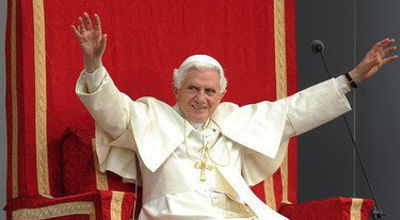US Catholics Divided on Church’s Direction Under New Pope
As the pontificate of Benedict XVI winds down, many American Catholics express a desire for change, according to a new survey report by the Pew Research Center. For example, most Catholics say it would be good if the next pope allows priests to marry. And fully six in 10 Catholics say it would be good if the next pope hails from a developing region like South America, Asia or Africa.
At the same time, many Catholics also express appreciation for the traditions of the Roman Catholic Church. While about half of U.S. Catholics (46 percent) say the next pope should “move the church in new directions,” the other half (51 percent) say the new pope should “maintain the traditional positions of the church.” And among Catholics who say they attend Mass at least once a week, nearly two-thirds (63 percent) want the next pope to maintain the church’s traditional positions.
These are among the key findings of a new report by the Pew Research Center’s Forum on Religion & Public Life based on two national surveys conducted Feb. 13-18 among 1,504 adults (including 304 Catholics) and Feb. 14-17 among 1,003 adults (including 212 Catholics).
The report also finds that nine-in-ten U.S. Catholics have heard a lot (60 percent) or at least a little (30 percent) about Benedict’s resignation. Just one in 10 Catholics say they have heard nothing at all about his resignation.
Additional findings include:
- Favorability ratings of the pope. Three-quarters of U.S. Catholics (74 percent) express a favorable view of the pope. Benedict’s ratings among Catholics now stand about where they were in March 2008 (just before his U.S. visit) and are lower than they were in April 2008, when 83 percent of U.S. Catholics expressed favorable views of him. Benedict’s predecessor, Pope John Paul II, was rated favorably by upwards of 90 percent of U.S. Catholics in three separate Pew Research polls in the 1980s and 1990s.
- Benedict’s handling of the sex abuse scandal. U.S. Catholics voice dissatisfaction with Benedict’s handling of the sex abuse scandal in the church. Among Catholics who say they followed news of the pontiff’s resignation, nearly two-thirds (63 percent) think he has done a poor or “only fair” job of addressing the sex abuse scandal, while 33 percent give him excellent or good ratings for his handling of the issue. U.S. Catholics are more negative in their views on this question now than in 2008; immediately following the pope’s 2008 visit to the U.S., 49 percent gave Benedict good or excellent ratings for his handling of this issue.
- Benedict’s handling of interfaith relations. Benedict gets better marks for his handling of interfaith relations; 55 percent of U.S. Catholics say he has done a good or excellent job promoting relations with other religions, while 37 percent say he has done a poor or “only fair” job in this area. Catholics are also more negative in their views on this question now than in 2008, when 70 percent said he was doing a good or excellent job promoting interfaith relations.
- Maintain traditional positions or move in new directions? Among U.S. Catholics who say they attend Mass at least once a week, nearly two-thirds (63 percent) say the new pope should maintain the traditional positions of the church, while about one-third (35 percent) say the new pope should move the church in new directions. By contrast, among those who attend Mass less often, 54 percent say the next pope should move in new directions while 42 percent prefer to maintain the church’s traditional positions.
- New directions Catholics would like to see the church explore. In response to an open-ended question, about one-in-five U.S. Catholics who think the next pope should move the church in new directions say simply that the church should become more modern (19 percent). And 15 percent want the next pope to do more to end sex abuse in the church and punish the priests involved.
In addition, upwards of one in five mention issues regarding the priesthood, including 14 percent who say priests should be allowed to marry and 9 percent who say women should be allowed to serve in the priesthood.
Others mention a desire to see the church become more accepting and open in general (14 percent), and an additional 9 percent say they want to see the church become more accepting of homosexuality and gay marriage in particular. Of Catholics who want a pope who will move the church in new directions, 7 percent specifically mention birth control, mainly indicating a desire for a lessening of the church’s opposition to the use of contraception.














































